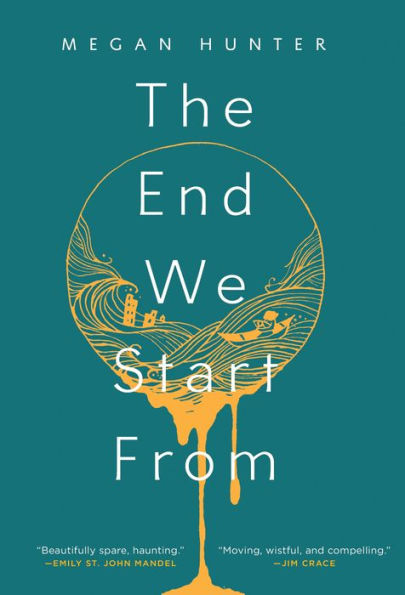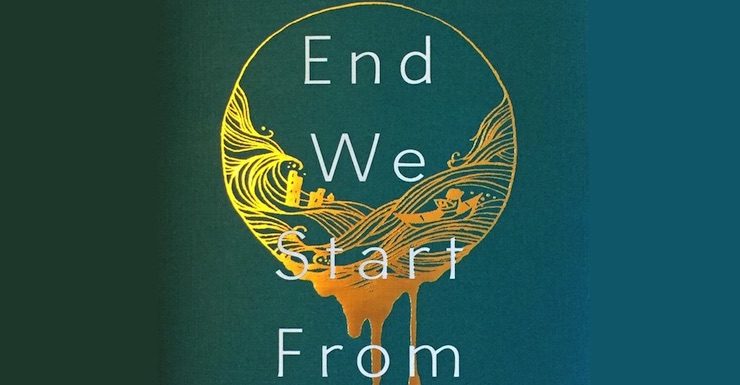Where Walter M. Miller, Jr.’s Canticle for Leibowitz gradually unveiled its catastrophe through a series of unreliable narrators, and Cormac McCarthy’s The Road meditated on every grim reality of life after a societal collapse, in Megan Hunter’s new novel, The End We Start From, the apocalypse unfolds in the background of the story, refracted through the first few months of a baby’s life.
The unnamed narrator gives birth bare days before floodwaters begin to overtake London. Soon she and her husband are both brand-new parents and refugees seeking higher ground. This gives the story both an urgency, and a haunting, far away feeling, as the narrator can’t think too far beyond the needs of her baby, but she is also terrified at all times that he won’t survive.
Buy the Book


The End We Start From
It’s a fascinating way to tell this kind of a story, because we get all the details needed to see what’s happening to England, and the ways constructs like governments and neighborlinesss can collapse under the weight of a crisis, but we get them in tiny snippets as we’re also learning that “Z” is taking to breastfeeding well, that he has a cold, that he’s started to smile. It also makes the danger hit that much harder. The narrator’s husband (called only “R” as his parents are only called “G” and “N”) goes out to restock the food supplies. Each time they leave, it takes longer for them to come back, and they’ve had a scarier time. When it comes time to seek even higher ground, there are border crossings and camps. It turns out that having a baby doesn’t make border guards any kinder. It turns out there are people in the camps who want your baby to stop crying, and don’t care that he has colic—because they have their own troubles and they need to sleep while they can. BUT. There are also sweet people in the camps, mothers who are nursing their own children, young men who are willing to help without asking for anything in return.
On the less dystopic side, I’m guessing that most new parents would consider this the best way to talk about what’s happened to them. They had one life before the baby, and now that life is a distant memory shattered by exhaustion and worry, that only starts to feel real again as the kid approaches pre-school age.
Like Jenny Offill’s Dept. of Speculation and some of Maggie Nelson’s work, the book is written in tiny intense snippets that are more like scraps of poetry than traditional prose. This can make the book a quick read if you want, but so much emotion is packed into each moment that my advice is to read slowly and savor each section. Hunter has said in interviews that she means the book to be read as though the narrator is writing it, like a journal, as the world falls apart around her. She can only think in tiny fragments for a while, and then she only has time to scribble a few words down before she either needs to tend the baby or find higher ground, so the style perfectly reflects the mood of the book.
Her other innovation is to create a counterpoint with accounts of creation stories, floods, and catastrophes from world mythology. At points the narrator feels like Eve making a new world, populating an emptiness. At other times she and her husband are Noah and his wife, and their car becomes an ark filled with cans of food and a weeks’ worth of diapers rather than paired animals. In these echoes from past disasters, the floodwaters sometimes recede, and sometimes, don’t. Sometimes the birds come back with leaves clutched in their beaks, but sometimes there’s no escape from the water.
At first there was only the sea, only the sky. From the sky came a rock, which dropped deep into the sea. A thick slime covered the rock, and from this slime words grew.
Then they saw an angel standing in the light of the sun with his arms outstretched. H called to all the birds that fly, and they came.
The earth will rise up one day, from the surface of the waves. Every land will be empty, and covered in morning dew.
These interjections work perfectly to connect this brief story to epic tales that came before it. It gives the tiny triumphs and sorrows of the narrator’s new life a feeling of cosmic importance that underlines both the exhilaration of new parenthood, and the terror of thinking that the world you’ve known your entire life may never return. Even if the floodwaters recede, even if the narrator can return home with her family—what will home mean?
We live in a time when refuges teem across the earth looking for any kind of permanence or shelter. Hunter captures this with the narrator’s move from camp to camp, trying not to become too attached to people she meets. Her son is her anchor. We live in a time when climate change threatens more of us by the day. The narrator is driven from home by a natural disaster, but she’s caught off guard because her life in a big bustling city felt so stable. as a refugee she learns rapidly that there is no stability to be had—life can change in an instant, and u can go from happily painting a nursery to becoming one of those poor bastards on TV, trudging across a border into a country that doesn’t want you, desperately hoping you can feed your child for one more day, week, year. You just want your child to outlive you, and reach adulthood.
Even when the narrator finds relative safety, she knows it could all vanish in an instant. With this book, Megan Hunter is reminding all of us that even the most solid rock can be washed away, and even the most comfortable life can crumble—and when the end comes you have to know what to fight for, so you’ll be able to begin again.
Leah Schnelbach knows that as soon as this TBR Stack is defeated, another will rise in its place. Come give her reading suggestions on Twitter!










